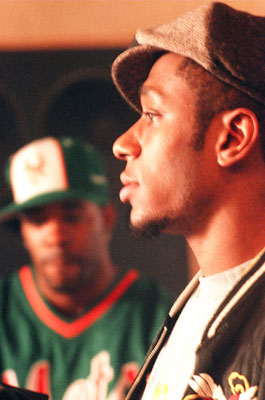
A review of Byron Hurt’s documentary on Masculinity in Hip Hop
America shines its whitest in the light of an exploding blackness, a spectacle crucial to the public drama of race. While racial issues have never been more orchestrated, no music has captured the spectacular quite like Hip-Hop, its larger-than-life masculinity scripted in crushing beats and contemptuous rhymes.
While some look to the days of African medallions and Public Enemy posters as a model of political and social consciousness, brothers in the street working it out often looked a lot like brothers working over non-blacks, black people who weren't "black enough," women, and gays. Somehow, this fervour chilled into a credo of money, power, and respect, and Hip-Hop went from the running man to a we-real-cool masquerade.
Enter Byron Hurt, the one-time journalist and college quarterback, who has also counselled young men on issues of male identity, sexism and homophobia.
"Beyond Beats and Rhymes" reflects his activist experiences as Hurt directs his comments to his viewers and speaks in the Hip-Hop vernacular. He confesses and then sheds his playboy past - establishing his man-cred, then takes Hip-Hop to task for its uber-male aspirations.
Reminiscent of Michael Moore, Hurt uses a variety of perspectives and asks pointed questions about controversial subjects. This bold, the-only-reason-you-won't-slap-me-is-because-this-camera-is-running approach maintains tension throughout the film. And there are a few incidents—Busta Rhymes, Russell Simmons, and BET's Steve Hill probably won't send Kwanzaa cards this year.
However, Hurt is well received by academics and activists such as Jelani Cobb, Sarah Jones and the eerily ubiquitous Eric Michael Dyson; their scholarly slang breaks down the contexts and contradictions of Hip-Hop's thug leanings. The likes of Jadakiss, Fat Joe and Talib Kweli make it plain with street philosophy and industry insight. The film's narrative spins its journalistic, scholarly and cultural sources into 62 minutes of myth-shattering magic. So much so that one might overlook its sleight-of-hand treatment of some of the black masculinity's foils. White people, for instance, are portrayed as voyeurs, crude imitators or Willie Lynch-like exploiters of Hip-Hop. Though his investigation of Spring Bling does expose the misogyny of what is often excused as men behaving badly, Hurt's use of female images is at times more "Girls Gone Wild" than "anti-sexist treatise." And his clever linking of hyper-masculinity and homoeroticism relies on a homophobic response to complete it.
Nonetheless, it is a film worth watching. "Beyond Beats and Rhymes" is a meandering but purposeful documentary - one rich with surprises, humour and poignancy. Hurt's definition of masculinity seems much more useful than running-man ideas of progress and is a zillion times more sensible than the tableau of hustlers, pimps and thugs that is mainstream Hip-Hop. Hurt portrays manhood as a conversation - one that is very selective about the cues it takes from Hip-Hop and the world. In this, a man's definition of himself naturally moves beyond beats and rhymes.
"Beyond Beats and Rhymes" will play on Saturday, May 6th, 2006, at 1:30 p.m. at the NFB Cinema (150 John Street) as part of Hot Docs. It will also air on PBS' Independent Lens sometime in 2006. Check www.pbs.org for more information.

